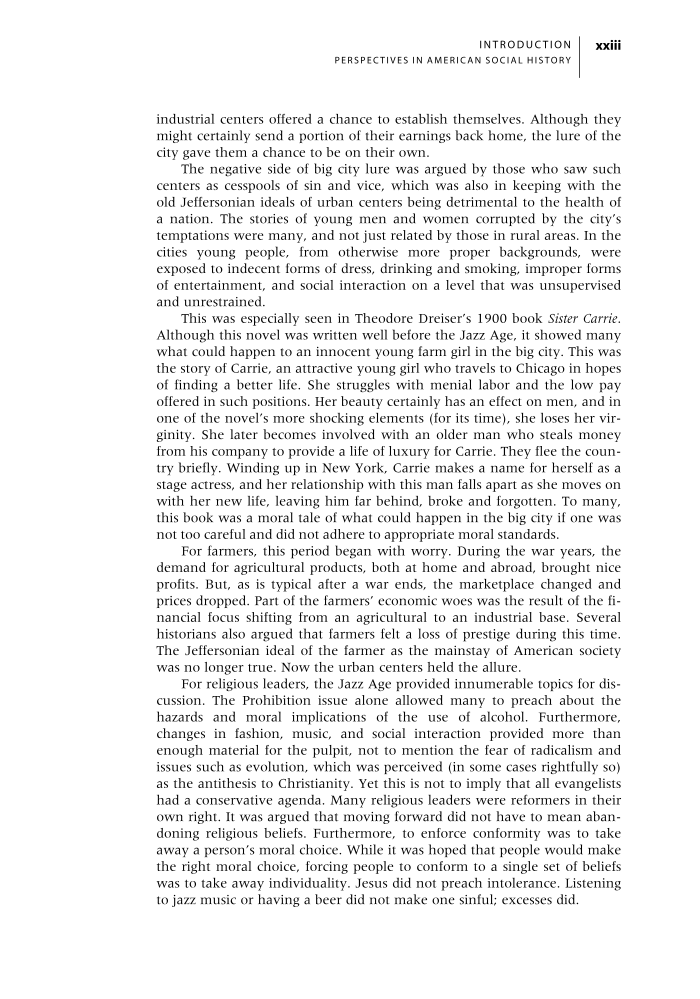industrial centers offered a chance to establish themselves. Although they might certainly send a portion of their earnings back home, the lure of the city gave them a chance to be on their own. The negative side of big city lure was argued by those who saw such centers as cesspools of sin and vice, which was also in keeping with the old Jeffersonian ideals of urban centers being detrimental to the health of a nation. The stories of young men and women corrupted by the city’s temptations were many, and not just related by those in rural areas. In the cities young people, from otherwise more proper backgrounds, were exposed to indecent forms of dress, drinking and smoking, improper forms of entertainment, and social interaction on a level that was unsupervised and unrestrained. This was especially seen in Theodore Dreiser’s 1900 book Sister Carrie. Although this novel was written well before the Jazz Age, it showed many what could happen to an innocent young farm girl in the big city. This was the story of Carrie, an attractive young girl who travels to Chicago in hopes of finding a better life. She struggles with menial labor and the low pay offered in such positions. Her beauty certainly has an effect on men, and in one of the novel’s more shocking elements (for its time), she loses her vir- ginity. She later becomes involved with an older man who steals money from his company to provide a life of luxury for Carrie. They flee the coun- try briefly. Winding up in New York, Carrie makes a name for herself as a stage actress, and her relationship with this man falls apart as she moves on with her new life, leaving him far behind, broke and forgotten. To many, this book was a moral tale of what could happen in the big city if one was not too careful and did not adhere to appropriate moral standards. For farmers, this period began with worry. During the war years, the demand for agricultural products, both at home and abroad, brought nice profits. But, as is typical after a war ends, the marketplace changed and prices dropped. Part of the farmers’ economic woes was the result of the fi- nancial focus shifting from an agricultural to an industrial base. Several historians also argued that farmers felt a loss of prestige during this time. The Jeffersonian ideal of the farmer as the mainstay of American society was no longer true. Now the urban centers held the allure. For religious leaders, the Jazz Age provided innumerable topics for dis- cussion. The Prohibition issue alone allowed many to preach about the hazards and moral implications of the use of alcohol. Furthermore, changes in fashion, music, and social interaction provided more than enough material for the pulpit, not to mention the fear of radicalism and issues such as evolution, which was perceived (in some cases rightfully so) as the antithesis to Christianity. Yet this is not to imply that all evangelists had a conservative agenda. Many religious leaders were reformers in their own right. It was argued that moving forward did not have to mean aban- doning religious beliefs. Furthermore, to enforce conformity was to take away a person’s moral choice. While it was hoped that people would make the right moral choice, forcing people to conform to a single set of beliefs was to take away individuality. Jesus did not preach intolerance. Listening to jazz music or having a beer did not make one sinful excesses did. I N T R O D U C T I O N P E R S P E C T I V E S I N A M E R I C A N S O C I A L H I S T O R Y xxiii
Document Details My Account Print multiple pages
Print
You have printed 0 times in the last 24 hours.
Your print count will reset on at .
You may print 0 more time(s) before then.
You may print a maximum of 0 pages at a time.









































































































































































































































































































